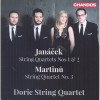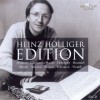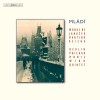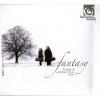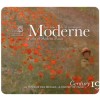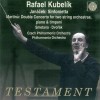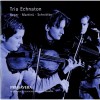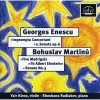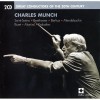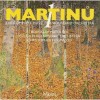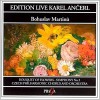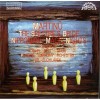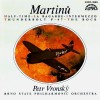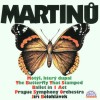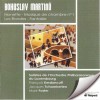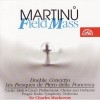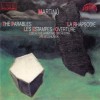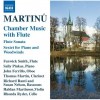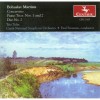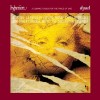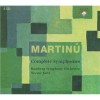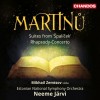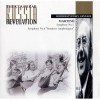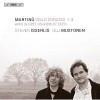Composers
Bohuslav Martinů (Czech pronunciation: [ˈboɦuslaf ˈmarcɪnuː] ( listen); December 8, 1890 – August 28, 1959) was a prolific Czech composer of modern classical music. Martinů wrote six symphonies, 15 operas, 14 ballet scores and a large body of orchestral, chamber, vocal and instrumental works. Martinů became a violinist in the Czech Philharmonic Orchestra, and taught music in his home town. In 1923 Martinů left Czechoslovakia for Paris, and deliberately withdrew from the Romantic style in which he had been trained. In the 1930s he experimented with expressionism and constructivism, and became an admirer of current European technical developments, exemplified by his orchestral works Half-time and La Bagarre. He also adopted jazz idioms, for instance in his Kuchyňské revue ("Kitchen Revue").
In the early 1930s he found his main font for composition style, the neo-classical as developed by Stravinsky. With this, he greatly expanded to become an amazingly prolific composer, composing volleys of well-crafted chamber, orchestral, choral and instrumental works, and was able to do this with amazing dispatch. His use of the piano obbligato became his signature. His Concerto Grosso and the Double Concerto for Two String Orchestras, Piano and Tympani are among his most powerful from this period. Among his operas, Juliette and The Greek Passion are considered the finest. He is compared with Prokofiev and Bartók in his innovative incorporation of Central European ethnomusicology into his music. He continued to use Bohemian and Moravian folk melodies throughout his oeuvre, usually nursery rhymes—for instance in Otvírání studánek ("The Opening of the Wells").
His great symphonic career began when he emigrated to the United States in 1941, fleeing the German invasion of France, to compose his six symphonies, which were performed by all the major US orchestras. Eventually Bohuslav Martinů returned to live in Europe in 1956, dying in Switzerland in August 1959.
Recently Added
Biography
Bohuslav Martinů (Czech pronunciation: [ˈboɦuslaf ˈmarcɪnuː] ( listen); December 8, 1890 – August 28, 1959) was a prolific Czech composer of modern classical music. Martinů wrote six symphonies, 15 operas, 14 ballet scores and a large body of orchestral, chamber, vocal and instrumental works. Martinů became a violinist in the Czech Philharmonic Orchestra, and taught music in his home town. In 1923 Martinů left Czechoslovakia for Paris, and deliberately withdrew from the Romantic style in which he had been trained. In the 1930s he experimented with expressionism and constructivism, and became an admirer of current European technical developments, exemplified by his orchestral works Half-time and La Bagarre. He also adopted jazz idioms, for instance in his Kuchyňské revue ("Kitchen Revue").
In the early 1930s he found his main font for composition style, the neo-classical as developed by Stravinsky. With this, he greatly expanded to become an amazingly prolific composer, composing volleys of well-crafted chamber, orchestral, choral and instrumental works, and was able to do this with amazing dispatch. His use of the piano obbligato became his signature. His Concerto Grosso and the Double Concerto for Two String Orchestras, Piano and Tympani are among his most powerful from this period. Among his operas, Juliette and The Greek Passion are considered the finest. He is compared with Prokofiev and Bartók in his innovative incorporation of Central European ethnomusicology into his music. He continued to use Bohemian and Moravian folk melodies throughout his oeuvre, usually nursery rhymes—for instance in Otvírání studánek ("The Opening of the Wells").
His great symphonic career began when he emigrated to the United States in 1941, fleeing the German invasion of France, to compose his six symphonies, which were performed by all the major US orchestras. Eventually Bohuslav Martinů returned to live in Europe in 1956, dying in Switzerland in August 1959.
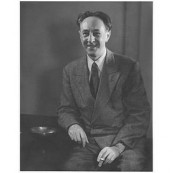

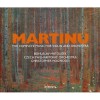
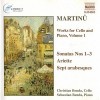
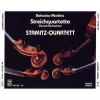
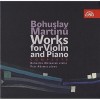
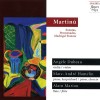
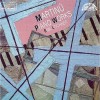
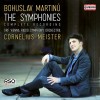
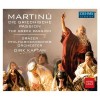
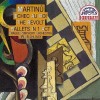
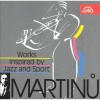
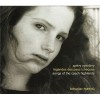


![Great European Organs. 17-John Scott Whiteley [Haderslev Cathedral]](http://static.classicalm.com/repository/collection-cover/small/873-img1340980189687097.jpg)
![Great European Organs. 67-Michal Novenko [Povyseni sv.Krize, Litomysl]](http://static.classicalm.com/repository/collection-cover/small/973-img1342720942767973.jpg)
